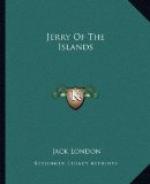“As an old man to an old man, I talk,” was Bashti’s beginning. “I am older than you, O Nalasu; I have ever been unafraid. Yet never have I been braver than you. I would that every man of the tribe were as brave as you. Yet do you give me great sorrow. Of what worth are your courage and cunning, when you have no seed to make your courage and cunning live again?”
“I am an old man,” Nalasu began.
“Not so old as I am,” Bashti interrupted. “Not too old to marry so that your seed will add strength to the tribe.”
“I was married, and long married, and I fathered three brave sons. But they are dead. I shall not live so long as you. I think of my young days as pleasant dreams remembered after sleep. More I think of death, and the end. Of marriage I think not at all. I am too old to marry. I am old enough to make ready to die, and a great curiousness have I about what will happen to me when I am dead. Will I be for ever dead? Will I live again in a land of dreams—a shadow of a dream myself that will still remember the days when I lived in the warm world, the quick juices of hunger in my mouth, in the chest of the body of me the love of woman?”
Bashti shrugged his shoulders.
“I too, have thought much on the matter,” he said. “Yet do I arrive nowhere. I do not know. You do not know. We will not know until we are dead, if it happens that we know anything when what we are we no longer are. But this we know, you and I: the tribe lives. The tribe never dies. Wherefore, if there be meaning at all to our living, we must make the tribe strong. Your work in the tribe is not done. You must marry so that your cunning and your courage live after you. I have a wife for you—nay, two wives, for your days are short and I shall surely live to see you hang with my fathers from the canoe-house ridgepole.”
“I will not pay for a wife,” Nalasu protested. “I will not pay for any wife. I would not pay a stick of tobacco or a cracked coconut for the best woman in Somo.”
“Worry not,” Bashti went on placidly. “I shall pay you for the price of the wife, of the two wives. There is Bubu. For half a case of tobacco shall I buy her for you. She is broad and square, round-legged, broad-hipped, with generous breasts of richness. There is Nena. Her father sets a stiff price upon her—a whole case of tobacco. I will buy her for you as well. Your time is short. We must hurry.”
“I will not marry,” the old blind man proclaimed hysterically.
“You will. I have spoken.”
“No, I say, and say again, no, no, no, no. Wives are nuisances. They are young things, and their heads are filled with foolishness. Their tongues are loose with idleness of speech. I am old, I am quiet in my ways, the fires of life have departed from me, I prefer to sit alone in the dark and think. Chattering young things about me, with nothing but foam and spume in their heads, on their tongues, would drive me mad. Of a surety they would drive me mad—so mad that I will spit into every clam shell, make faces at the moon, and bite my veins and howl.”




